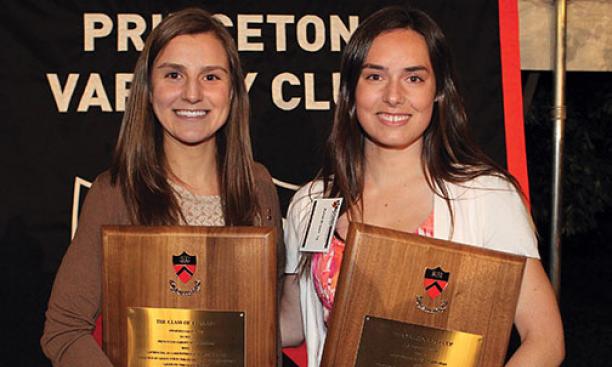

Randi Brown ’14 and Rachel Zambrowicz ’14 met five years ago, while visiting Princeton as recruits for the diving team. After arriving on campus as freshmen, they became best friends. They trained together, competed together, ate nearly every meal together, and studied together. They even chose the same major, ecology and evolutionary biology.
“Since we were always together, the team always joked that we were the same person,” Brown laughed. “They would get us confused.”
A few days before Commencement, Brown and Zambrowicz were linked once again: The two shared the Class of 1916 Cup, given to the senior athlete with the highest academic standing.
Competing at a high level in the pool and in the classroom was challenging, Zambrowicz said, but “the bonds that you make with your teammates help you manage that balance.” She credited coach Greg Gunn with making practice times flexible. (Most team sports don’t afford that luxury, but divers are able to train individually.)
For Brown, senior year provided the most significant obstacles. She was spending at least two hours a day in the lab, four or five days a week, for much of the diving season — and even more time at the pool. She didn’t want to sacrifice sleep, so she scaled back on social events.
Brown’s senior thesis studied communication between marmosets. The small primates “exchange vocalizations in a way that is like a conversation,” she said, and she examined this in a lab setting by having a marmoset interact with recorded vocalizations. “I found that the marmosets did seem to respond to the speaker like it was another marmoset, so that was cool,” said Brown, who plans to study neuroscience at the University of Oxford in the fall.
Zambrowicz, an All-Ivy diver and recipient of her department’s senior book prize, studied personal genome sequencing for her thesis project. She had her own exome sequenced and explored the results. She also researched some of the ethical and practical issues related to employing genetic sequencing as a tool for preventive medicine. “Until we have huge amounts of data,” she said, “it’s not going to be particularly useful.” But someday, Zambrowicz may be in a position to apply the data to improve health and wellness — she’ll be working at a hospital and applying to medical schools in the coming year.
Sports fans tend to find tie scores unfulfilling, and in the case of the Class of 1916 Cup, ties are relatively rare (the last one was in 1998). But for Zambrowicz and Brown, it seems like an ideal result. The teammates supported each other through the challenges of long seasons, difficult classes, and hectic schedules. In a solitary sport, they were partners, from start to finish. As Brown said, “It’s just the perfect way to end.”
